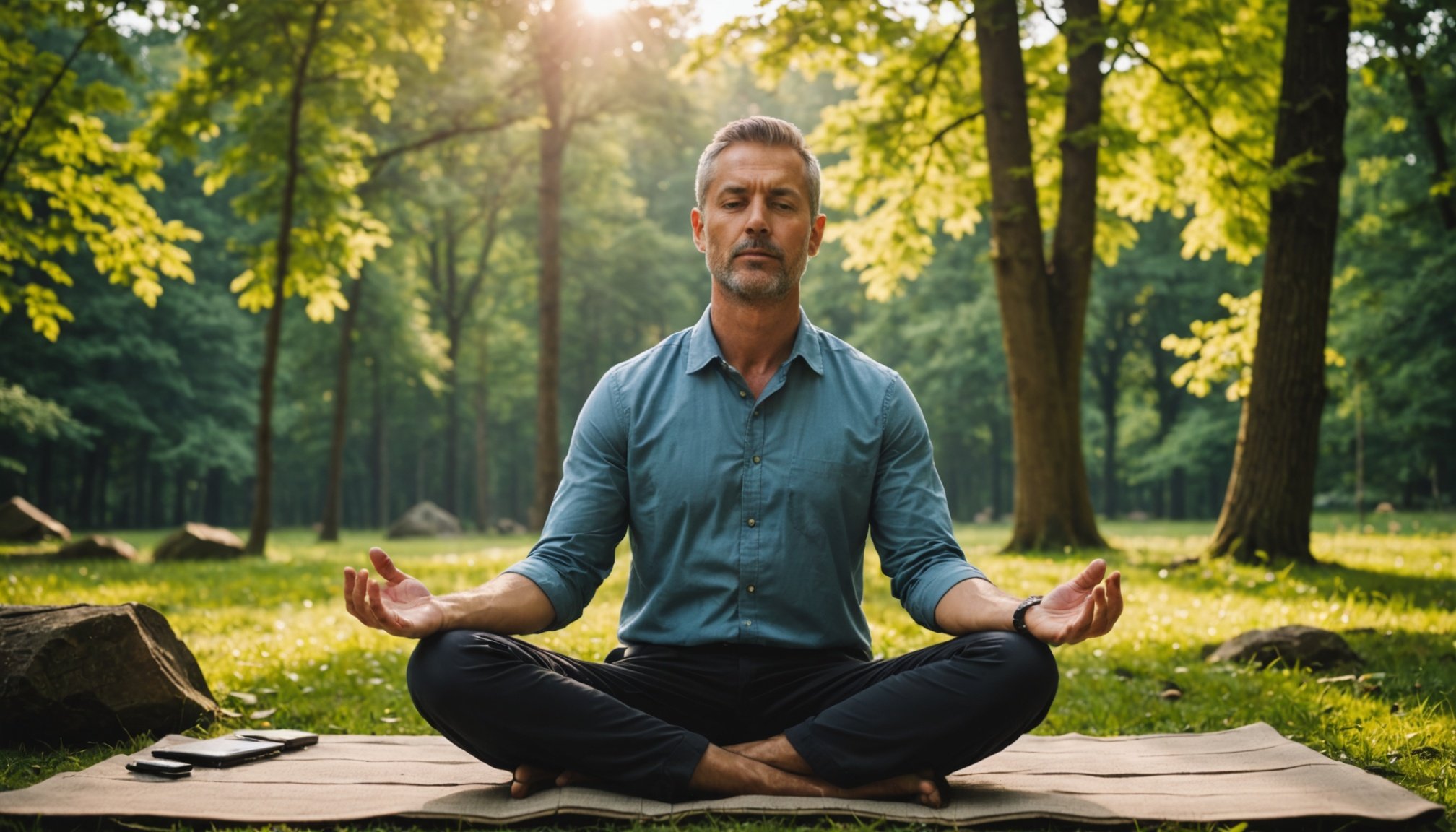Overview of Mindfulness and Its Benefits
Mindfulness involves focusing completely on the present moment, acknowledging your thoughts and feelings without judgment. Rooted in ancient meditation practices, its core principles include awareness, acceptance, and non-judgmental observation. This gentle focus encourages a serene mental space, steering attention away from ruminating on past events or worrying about the future.
Practising mindfulness provides numerous benefits for both psychological and physiological health. One of the most celebrated advantages is stress relief. By promoting a state of relaxation and clarity, mindfulness helps lower stress levels, fostering a sense of calm and balance. Additionally, it’s linked to improved mental well-being, often leading to enhanced focus and reduced symptoms of anxiety and depression.
Additional reading : Crafting an All-Encompassing Wellness Strategy to Tackle Seasonal Health Issues
There is substantial evidence supporting the efficacy of mindfulness in stress reduction. Research consistently demonstrates that mindfulness practices, such as meditation and deep breathing, can decrease cortisol levels, which are often referred to as the “stress hormone.” Once integrated into daily life, these practices not only alleviate stress but also contribute to overall emotional resilience. Incorporating mindfulness into your routine could be a simple but powerful step towards nurturing both your mind and body.
Creating Your Daily Mindfulness Routine
Incorporating a daily mindfulness practice into your life can bring profound benefits without major lifestyle overhauls. The key to success is routine building, which involves consciously designing a structure that fits seamlessly into your day.
Also read : Designing Your Custom Yoga Practice: Effective Strategies for Alleviating Back Pain
Key Components of an Effective Mindfulness Routine
A successful mindfulness routine often starts in the morning. Schedule a few quiet moments to engage in simple breathing exercises. This sets a peaceful tone for the day ahead. Incorporate mindfulness techniques like meditation or gratitude journaling into your morning rituals. These activities forge a sense of presence that’s carried throughout the day.
Morning Rituals to Start the Day
An effective morning ritual might include gentle stretches followed by a few moments of stillness. To enhance your daily mindfulness practice, try mindfully sipping your morning tea or coffee, paying attention to the aroma, taste, and warmth. Such mindful consumption encourages focus and contentment.
Techniques for Mindfulness Throughout the Day
Mindfulness doesn’t stop in the morning. Integrate small practices during mundane activities like walking or eating. For instance, active listening promotes engagement and enriches conversations by focusing on the speaker’s words and tone. Implementing these techniques consistently fosters an unwavering sense of calm and clarity amidst the chaos of daily life.
Mindfulness Practices for Stress Relief
Adopting mindfulness exercises is one of the most effective ways for stress management, providing both immediate and long-term benefits. These practices often involve meditation techniques aimed at enhancing your overall well-being.
Breathing Techniques
Breathing techniques are fundamental to reduce immediate stress. By focusing on your breath, you can centre your mind and calm your body. Start by inhaling deeply through your nose, hold your breath for a few seconds, then exhale slowly through your mouth. Repeat this cycle several times, allowing each breath to be slower and deeper than the last. This technique not only lowers stress hormone levels but also promotes a sense of calm.
Guided Meditation
Guided meditation sessions can further facilitate stress management by leading you through visual imagery and soothing speech. In a typical session, you listen to a guide through meditation techniques designed to focus your mind and relax your body. These sessions can include focusing on a peaceful scene or slowly unwinding tension from each part of your body. They are especially useful for beginners, offering a structured framework for relaxation.
Body Scan
Performing a body scan is an effective way to increase relaxation and awareness. This involves slowly directing your attention to each area of your body, from head to toe, and consciously relaxing each muscle. Body scans can alleviate stress by enhancing your awareness of physical sensations, helping you release tension you might not have realised you were holding.
Overcoming Challenges in Mindfulness Practice
Mindfulness involves being fully present, yet many people face mindfulness challenges that interfere with staying consistent. A primary obstacle is the difficulty in maintaining consistency. Life’s demands can lead to missed sessions, making it tough to build a habit. However, solutions for mindfulness are available to combat these hurdles.
Embracing flexibility is key. A rigid schedule can increase frustration, especially when unexpected tasks arise. To counter this, adapt your practice to your lifestyle. If mornings are hectic, try incorporating short afternoon sessions. This approach allows mindfulness to become a seamless part of daily life.
External distractions pose another significant challenge. Reducing environmental stimuli can improve focus and effectiveness. Consider creating a dedicated space for your practice or utilizing noise-cancelling headphones to minimise interruptions.
Time constraints often deter individuals from practicing mindfulness. Integrating brief techniques like three-minute breathing exercises into your routine can help. These sessions are manageable and maintain the benefits of mindfulness even when time is limited.
By addressing these hurdles with creativity and adaptability, you can establish a more resilient mindfulness practice. Remember, each small effort contributes to a more mindful, balanced life.
Expert Opinions and Testimonials
Mindfulness offers significant benefits for stress relief, as supported by expert insights and testimonial accounts. Leading mindfulness practitioners frequently highlight how developing a state of conscious presence can effectively improve mental well-being. Dr. Tara Brach, a well-respected psychologist and meditation teacher, notes, “Mindfulness helps individuals recognise the impermanent nature of stress responses, allowing them to find internal tranquillity.”
User testimonials further support these claims, detailing how mindfulness practices have impacted their lives. Jane, a corporate manager, shares her experience: “Incorporating mindfulness into my daily routine immensely alleviated my stress, resulting in a more balanced work-life dynamic.”
Success stories from these testimonials exemplify the transformative power of mindfulness. For instance, a testimonial from a university student attributes mindfulness exercises to her academic success, enhancing her focus and reducing anxiety before exams.
The real-world examples and expert insights clearly illustrate the substantial benefits of mindfulness in managing stress. Practitioners and users alike provide valuable narratives attesting to its positive impact. This collection of expert opinions and personal stories offers compelling evidence, encouraging individuals to explore mindfulness for stress relief.
Maintaining Consistency in Your Practice
Consistency is key when integrating mindfulness into your daily routine. To achieve mindfulness consistency, start by identifying times of day when you’re most receptive to practice. Mornings can be ideal, setting a reflective tone for the rest of the day.
Long-term practice requires developing a habit. Use reminders, such as setting an alarm or keeping a journal, to reinforce your commitment. Over time, these small, deliberate actions will weave mindfulness naturally into your lifestyle, becoming a habit formation without conscious effort.
Accountability plays a crucial role in sustaining practice. Share your goals with a friend or join a group. Having someone to check in with regularly can provide the motivation needed to stick with your regimen. A supportive community can enhance your experience and keep you committed.
Reflect and assess your progress. Regularly take time to evaluate how your mindfulness practice affects your life. Are there areas needing more focus? Are you noticing changes in your mindset? Personal assessments help fine-tune your approach, fostering continual improvement. Through these strategies, you enhance your ability to integrate mindfulness into your life sustainably and effectively.











